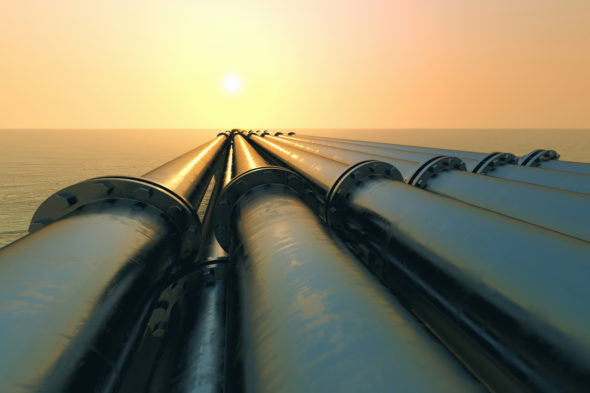
Energy is the lifeblood of the modern world, the fuel of prosperity but also of everyday life. Without energy, the lights go out, the heating shuts down, transport gets difficult as cars and planes stop running. Life as we know it comes to a halt. And pipelines are the arteries pumping that lifeblood across the European continent.
Europe’s dependence on oil and gas imports is one of the major challenges for the European Union, a challenge in which pipelines systems have supreme significance, providing European markets with energy resources: crude oil, natural gas, and liquid petroleum products.
The reliability of those pipelines is therefore of vital importance. With a long lifespan, efficient maintenance of those networks is crucial. And among the many energy initiatives pursued by the European Union, one project has played an important role in improving the security of the pipelines that crisscross the continent.
Its full name may be a tongue-twister, but there is no doubting the importance of what has been achieved by the INNOPIPES project (‘Innovative non-destructive testing and advanced composite repair of pipelines with volumetric surfaces defects’).
Between 2012 and 2016, INNOPIPES received funding under the EU’s Marie Skłodowska-Curie Actions – specifically its International Research Staff Exchange Scheme, that supports interaction between academia and non-academic organisations across the world.
Coordinated by the Riga Technical University in Latvia, and bringing together partners from Poland (the Military University of Technology in Warsaw), Bulgaria (the Institute of Mechanics of the Academy of Science) and Romania (the Petroleum-Gas University of Ploiesti), but also from Belarus, Ukraine and Russia, the collaboration has already laid down the roots for future partnerships.
Since the project ended last year, five agreements on academic collaboration have been signed, and three project proposals have been prepared by partners from the project, keen to extend their collaboration.
But it has also delivered concrete results, working on the areas of detection of corrosion damage in long-distance pipelines, and analysis of materials used in their repair, leading to a new procedure for determining the strength of repaired pipelines, and ways of assessing the effectiveness of composite repairs on damaged pipes.
Does it mean the pipelines are more secure as a result? “Yes, definitely more secure,” says Professor Evgeny Barkanov, project coordinator from the Riga Technical University, adding that the methodologies developed are already being used for prototype testing.
With Europe increasingly keen to diversify its supply routes, Bulgaria is vital to both the Nabucco and its rival South Stream pipeline projects to bring Caspian and Russian gas to Europe via the south-eastern route. Professor Mitko Mihovski, who coordinated the Bulgarian participation in the project, said the professional exchanges had given invaluable experience in non-destructive testing to his colleagues.
Through the project, he said, “Bulgaria improved in the development and investigation in new composite materials for pipeline repair, and was able to conduct non-destructive testing training using innovative methods for pipeline testing.”
“The research conducted in this project gave us the opportunity to improve the efficiency and safety of gas transmission. This experience will be useful for assessment and repair of pipelines in Bulgaria,” said Professor Mihovski.
Professor Barkanov from Riga said the techniques developed under the project would extend the lifespan of pipelines, saving money for governments and taxpayers across Europe. By contributing to more efficient transit, INNOPIPES has helped to keep the lifeblood pumping to our economies, helping us to sustain the lifestyle to which we have become accustomed.
Marie Skłodowska-Curie Actions – 20 years of European support for researchers’ work
Since 1996, the Marie Skłodowska-Curie Actions have provided grants to train excellent researchers at all stages of their careers – be they doctoral candidates or highly experienced researchers – while encouraging transnational, inter-sectoral and interdisciplinary mobility. Researchers working across all disciplines, from archaeology, life-saving healthcare to ‘blue-sky’ science, are eligible for funding.The programme is named after the double Nobel Prize winner Marie Skłodowska-Curie to honour and spread the values she stood for. To date, more than 110 000 researchers have participated in the programme with many more benefiting from it – among them nine Nobel laureates and an Oscar winner.
The MSCA earlier this year announced the funding of its 100 000th fellow. To celebrate this significant milestone, the European Commission is showcasing 30 exemplary researchers (among them 18 women) and their projects funded by the MSCA, highlighting the programme’s commitment to excellence and worldwide mobility in research.
The European Researchers’ Night (NIGHT) is a Europe-wide annual event, which takes place on the last Friday in September. Funded by the European Union through the Marie Skłodowska-Curie Actions (MSCA), it is designed to make EU scientific research fun and accessible for everyone. Started in 2005, the event offers its one million plus visitors every year a myriad of entertaining activities, including hands-on experiments, presentations, demos, quizzes, lab visits and opportunities to meet the researchers.
During the 2014 to 2020 funding period, with a budget of EUR 6.2 billion, the MSCA will support around 65 000 researchers, including 25 000 PhD candidates.